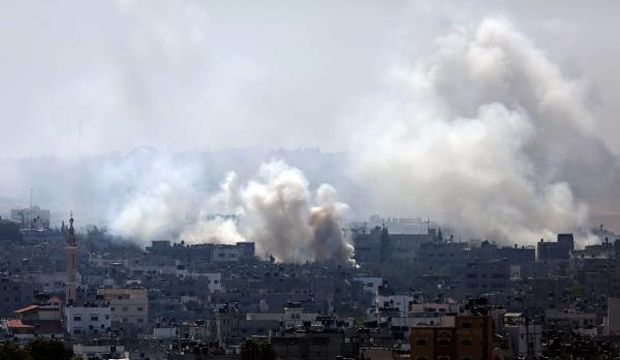
Smoke rises after Israeli tanks shell the Shejaia neighborhood during a military operation in the east of Gaza City, on July 27, 2014. (EPA/Mohammed Saber)
Gaza/Jerusalem, Reuters—A humanitarian truce in the Gaza Strip collapsed on Sunday after a barrage of rockets fired by Palestinian militants was met with fierce Israeli shelling, in a fresh setback to efforts to secure a permanent ceasefire.
Israeli tanks and artillery army pounded targets along the coastal enclave, sending thick plumes of black smoke rising into the sky, signaling an end its unilateral, 24-hour truce in the wake of the missile salvos.
Palestinian witnesses reported heavy shelling east of Gaza City, with ambulances immediately racing towards the area. At least three deaths were reported in separate strikes. More than 1,000 people, mainly civilians, have been killed in Gaza.
“Following Hamas’ incessant rocket fire throughout the humanitarian window, which was agreed upon for the welfare of the civilian population in Gaza, the [army] will now resume its aerial, naval and ground activity in the Gaza Strip,” a military statement said.
Israel and the Hamas Islamists who control Gaza had agreed to a 12-hour ceasefire on Saturday to allow Palestinians to stock up on vital supplies and retrieve bodies trapped under the rubble.
Israeli Prime Minister Benjamin Netanyahu’s cabinet decided to extend the quiet until midnight on Sunday, on condition that its forces could continue to track down and destroy militant tunnels that crisscross the Gaza border.
Hamas rejected the proposal and said its forces would keep fighting as long as Israeli troops remained in Gaza. The Islamist group said it had fired at the Israeli cities of Tel Aviv and Ashdod. No damage or injuries were reported.
Netanyahu was due to convene his cabinet later on Sunday to decide how to move forward, and at least one senior minister said Israel must step up its offensive.
“After what we saw this morning, it is clear we need to resume fighting with even greater force,” Communications Minister Gilad Erdan told Army Radio.
Israel launched its Gaza offensive on July 8. Hamas has struggled under an Israeli–Egyptian economic blockade on Gaza and was angered by a crackdown on its supporters in the nearby occupied West Bank.
After aerial and naval bombardment failed to quell the outgunned guerrillas, Israel poured ground forces into the Gaza Strip 10 days later, looking to knock out Hamas’s rocket stores and destroy the vast network of tunnels.
There appeared to be little progress on the diplomatic front and in international efforts to secure an end to the conflict.
US Secretary of State John Kerry flew back to Washington overnight after meeting in Paris with foreign ministers of France, Italy, Britain, Germany, Turkey and Qatar.
Meanwhile, demonstrators in London marched from the Israeli embassy to the House of Parliament in Whitehall to protest the Israeli incursion, blocking traffic throughout the West End. French police clashed with pro-Palestinian protesters defied a ban by authorities to march in central Paris
At least 1,050 Gazans—mostly civilians—have been killed in 20 days of fighting. An Israeli soldier was also killed overnight by cross-border mortar fire, bringing the army death toll to 43 soldiers, with three civilians killed in Israel by rocket and mortar attack.
The positions of both Israel and Hamas regarding a long-lasting halt to hostilities appear as far apart as ever.
Hamas wants an end to the blockade of Gaza before agreeing to halt hostilities. Israeli officials said any ceasefire must allow the military to carry on hunting down the Hamas tunnels.
Some of the tunnels reach into Israeli territory and have been used to carry out surprise attacks on Israelis. Other underground passages serve as weapons caches and Hamas bunkers.
Israel says its forces have uncovered more than 30 tunnels, with four shafts discovered on Saturday alone. One official said troops had found it easier to operate during the truce as the immediate threat to their safety was diminished.
The Gaza turmoil has stoked tensions among Palestinians in mainly Arab East Jerusalem and the occupied West Bank.
Medics said eight Palestinians were killed on Friday in incidents near the West Bank cities of Nablus and Hebron—the sort of death toll reminiscent of previous uprisings against Israel’s prolonged military rule there.
During the lull in fighting inside Gaza on Saturday, residents flooded into the streets to discover scenes of massive destruction in some areas, including Beit Hanoun in the north and Shejaia in the east.
Israel hopes that the images of widespread desolation will persuade Gazans to put pressure on Hamas to stop the fighting for fear of yet more devastation.
